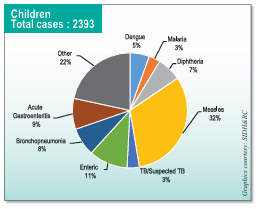Infectious diseases on the rise in Sindh
KARACHI: The Sindh Infectious Disease Hospital and Research Centre
(SIDH&RC) in Karachi reported a 6% increase in patient admissions in 2024, registering
7,645 cases from all major infection categories, compared to 2023 figures of inpatients.
This rise
is particularly alarming given the increased threat of tuberculosis (14% among
adults) and measles (32% among children).
According
to the SIDH’s annual data shared with Social
Track, the 173-bed hospital admitted 5,252 adults and 2,393 children in
2024, up from 4,923 adults and 2,296 children in 2023. The hospital also saw a
significant increase in outpatient visits, with 38,189 adults and children
attending clinics in 2024, a 33% rise from 2023, which, as per doctors,
reflects on considerable prevalence of infectious diseases that are grouped
like viral, bacterial, parasitic, fungal, transmissible and other infections.
The data further revealed that 805 patients, including 163 children, died at the hospital in 2024. Of the total admissions, 53% were males and 47% females.
Among
those who were admitted at the hospital located in Gulshan-e-Iqbal, there were
maximum 762 cases of measles, challenging the long continuing vaccine
preventable disease efforts made under the governmental arrangements. Measles
cases were followed by dengue (556 cases), pneumonia (553), enteric (505), TB
suspected (455), acute gastroenteritis (405), malaria (368), TB (270),
UTI/Urosepsis (258), COPD (240) and other cases.
The
hospital also treated 197 cases of diphtheria in 2024, up from 100 in 2023,
with 7% of cases involving children and 1% involving adults. Diphtheria has
been a public health concern remerging in the last couple of years in the
province.
Amid
growing concern of rising number of infectious diseases in the province, the
SIDH data mentioned of people living with human immunodeficiency virus (HIV),
with 208 newly detected cases in 2024. The hospital has around 350 registered
HIV patients, confided a source in the hospital.
Talking to this scribe, SIDH&RC Medical Superintendent, Dr Abdul Wahid Rajput, said that measles, diphtheria, gastroenteritis, bronchopneumonia and dengue were dominating diseases among the admitted children in 2024. “Our clinics handled patients suffering from infectious, pulmonary, nephrology, pediatric, and cardiac diseases, while around 20,000 patients were seen in the adult triage for emergency medical attention and care.
On a
question about the rising number of HIV patients registered at the hospital, Dr
Rajput said that cases did come from outside Karachi as well, and they were
tested for the disease and equally counselled about their future line of living
and behaviour. If found positive, the patient is referred to the provincial
government’s entity concerned for CD4 load assessment and provision of due
medicines, he added.
“HIV cases
detected here may be attributed to unsafe sex workers, unsafe blood transfusing
units and others,” he said while emphasising the need for enhancing HIV
prevention measures. According to him, sometimes patients admitted with chronic
diseases or compromised resistance are detected with HIV at later stage during
the course of treatment.
Stressing
the need for setting up more specialised infectious disease facilities at
secondary level in the public health sector, he shared that sometimes SIDH has
to deny or delay admissions to patients in view of the non-availability of HDU
or IDU units, with the notion that overall there is a need to create further
awareness about the infectious diseases, particularly the vaccine preventable
diseases, as well as strengthening physicians and allied medical hands against
these diseases at major hospitals.
News report courtesy:
Social Track, Karachi.






Comments
Post a Comment